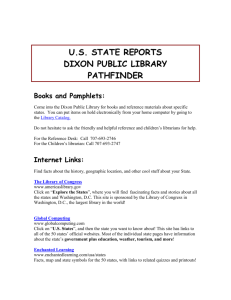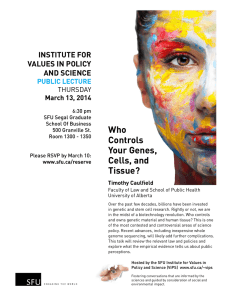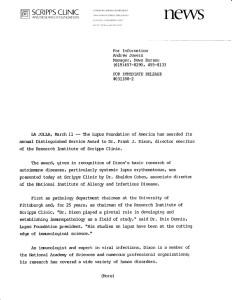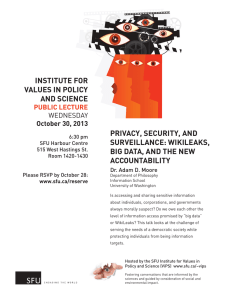History 439: Catholicism in Early Modern Europe Reading:
advertisement
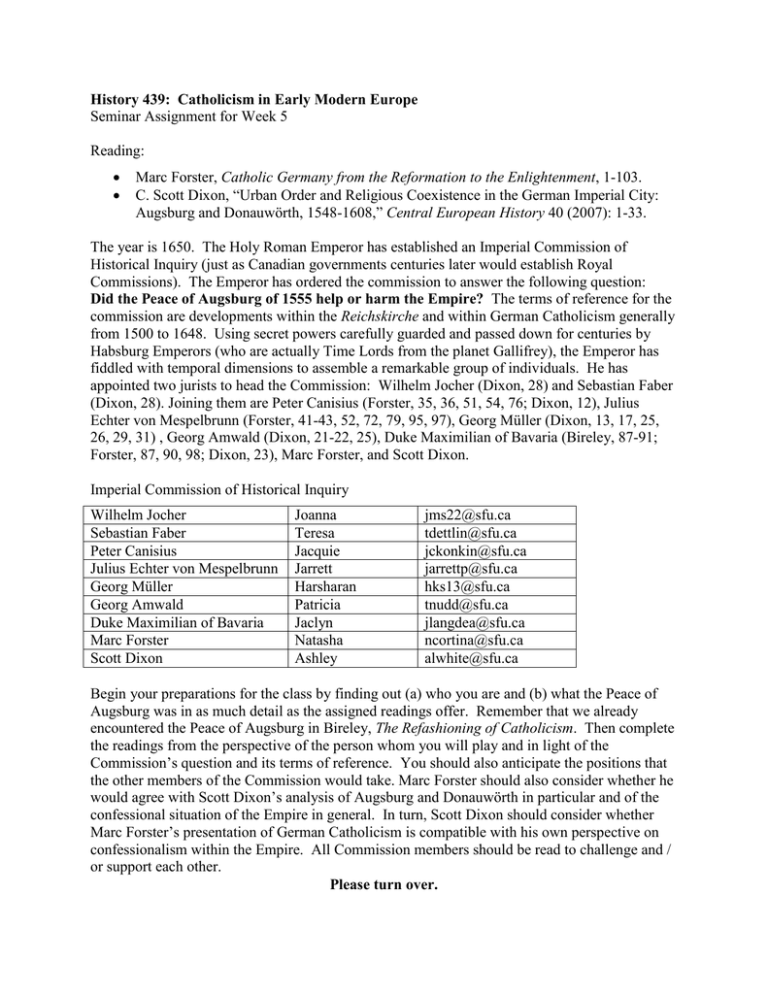
History 439: Catholicism in Early Modern Europe Seminar Assignment for Week 5 Reading: Marc Forster, Catholic Germany from the Reformation to the Enlightenment, 1-103. C. Scott Dixon, “Urban Order and Religious Coexistence in the German Imperial City: Augsburg and Donauwörth, 1548-1608,” Central European History 40 (2007): 1-33. The year is 1650. The Holy Roman Emperor has established an Imperial Commission of Historical Inquiry (just as Canadian governments centuries later would establish Royal Commissions). The Emperor has ordered the commission to answer the following question: Did the Peace of Augsburg of 1555 help or harm the Empire? The terms of reference for the commission are developments within the Reichskirche and within German Catholicism generally from 1500 to 1648. Using secret powers carefully guarded and passed down for centuries by Habsburg Emperors (who are actually Time Lords from the planet Gallifrey), the Emperor has fiddled with temporal dimensions to assemble a remarkable group of individuals. He has appointed two jurists to head the Commission: Wilhelm Jocher (Dixon, 28) and Sebastian Faber (Dixon, 28). Joining them are Peter Canisius (Forster, 35, 36, 51, 54, 76; Dixon, 12), Julius Echter von Mespelbrunn (Forster, 41-43, 52, 72, 79, 95, 97), Georg Müller (Dixon, 13, 17, 25, 26, 29, 31) , Georg Amwald (Dixon, 21-22, 25), Duke Maximilian of Bavaria (Bireley, 87-91; Forster, 87, 90, 98; Dixon, 23), Marc Forster, and Scott Dixon. Imperial Commission of Historical Inquiry Wilhelm Jocher Sebastian Faber Peter Canisius Julius Echter von Mespelbrunn Georg Müller Georg Amwald Duke Maximilian of Bavaria Marc Forster Scott Dixon Joanna Teresa Jacquie Jarrett Harsharan Patricia Jaclyn Natasha Ashley jms22@sfu.ca tdettlin@sfu.ca jckonkin@sfu.ca jarrettp@sfu.ca hks13@sfu.ca tnudd@sfu.ca jlangdea@sfu.ca ncortina@sfu.ca alwhite@sfu.ca Begin your preparations for the class by finding out (a) who you are and (b) what the Peace of Augsburg was in as much detail as the assigned readings offer. Remember that we already encountered the Peace of Augsburg in Bireley, The Refashioning of Catholicism. Then complete the readings from the perspective of the person whom you will play and in light of the Commission’s question and its terms of reference. You should also anticipate the positions that the other members of the Commission would take. Marc Forster should also consider whether he would agree with Scott Dixon’s analysis of Augsburg and Donauwörth in particular and of the confessional situation of the Empire in general. In turn, Scott Dixon should consider whether Marc Forster’s presentation of German Catholicism is compatible with his own perspective on confessionalism within the Empire. All Commission members should be read to challenge and / or support each other. Please turn over. While Wilhelm and Sebastian will chair the Commission and moderate the discussion, your character should feel free to speak (or interrupt) whenever appropriate to raise facts in support of the answer that you have. Your character may even be willing to change his mind in light of arguments presented by other Commission members. The discussion should demonstrate not only knowledge of your character and specific provisions of the Peace of Augsburg but also the following themes: Forster’s chronology of what he calls the “development of Catholic identity” evident in the subsequent themes the impact of the Protestant Reformation in Germany the early Catholic response to the Protestant Reformation the impact and effectiveness of the Counter Reformation, Tridentine Reform, and Catholic Reform the agents of Counter Reformation, Tridentine Reform, and Catholic Reform the Thirty Years War Catholic religious practice from 1500 to 1648 the political and religious situation of Augsburg and Donauwörth You need to be familiar with the following terms: confessionalization confessional identity Baroque Catholicism Reichskirche Hochstift Kelchbewegung Religious Reform Commission Collegium Germanicum (German College) Marian Congregations Congregatio Germanica (German Congregation, in operation from 1573 to 1578) papal nuncios provincial and diocesan synods Clerical Council Church Council social discipline Edict of Restitution Catholicization witch hunts Loreto (see also Bireley, 11011) Gregorian Calendar (see n. 33 in the article by Dixon) Battle of the Banners

